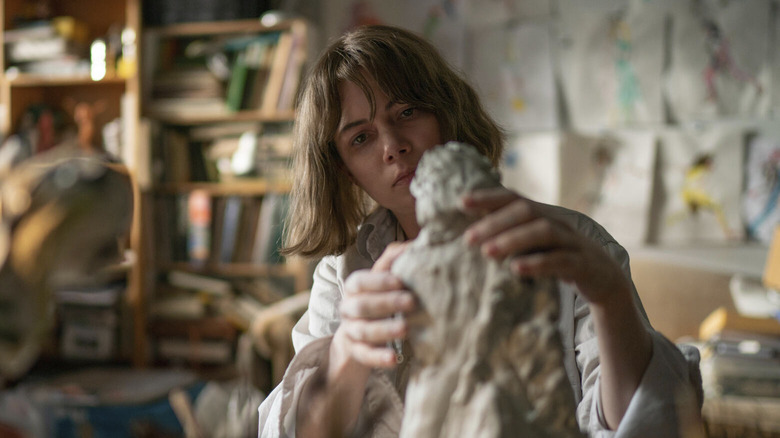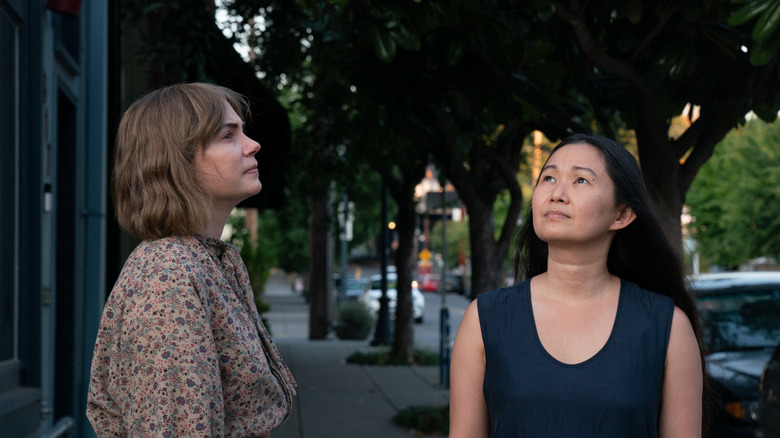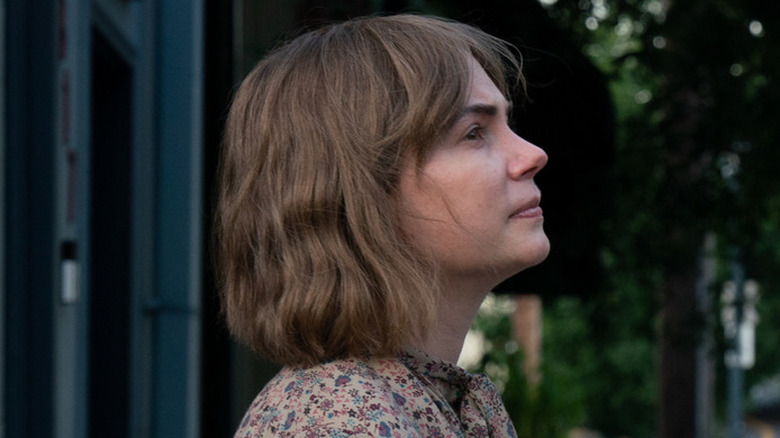Showing Up Review: Michelle Williams' Portrait Of A Frazzled Sculptor [NYFF]
"I won't get the time back," the artist laments. Alas, a day off from work should have been a sacred loss of productivity. But little worries slip through the cracks and nag at her.
In the hands of a less astute director, a portrait about a distressed artist — a sculptor in this case — may give into the worst impulses of indulgence or overexploitation. Luckily, director Kelly Reichardt never lets "Showing Up" (a simple and sparing screenplay by writer Jon Raymond) stumble into any of those pitfalls. It can be paired with "Tár" and "The Eternal Daughter," both (compelling) New York Film Festival selections that also focus on the tribulations of women nailed to their projects.
Though unlike Cate Blanchett's egomaniac conductor and Tilda Swinton's mournful screenwriter in these respective films, Michelle Williams' Portland sculptor in Reichardt's picture does not hail from a background of more lavish resources nor are her stakes as melodramatic. We can tell that life — and her budding career — has taught this sculptor, Lizzie, to tamp down her temper, most of the time. There are occurrences when Lizzie does let out some steam while she's prepping for her exhibition on a looming deadline. The first being her frustration over an unfixed water heater issue that her landlord-cum-artist-friend Jo (Hong Chau, who excellently plays an irritatingly lax bestie) has been flaking on. The second being an incident where she wrangles her (scene-stealing) cat after he assails a poor pigeon and drags the bird into her bathroom. "Go die somewhere else!" she utters as she dustpan-dumps the injured pigeon into her garden.
Michelle Williams, not unlike her Lucy in Reichardt's "Wendy and Lucy," bottles most of her emotions inside as she portrays an artist who sees little choice but to swallow the strife of incidents as she molds limbs and heads of clay. But that pigeon — symbolic of her personal affairs crowding into her schedule — does end up coming back in her life.
Acorns of drama and laughs
"Showing Up" isn't about anything grand. It zeroes in on the smallness of an Oregonian artist's everyday life, which sometimes rudely drips its acorns of drama into her life. The limits of Lizzie's professional bandwidth are especially tested when her landord pal ends up rescuing the aforementioned pigeon and shanghais the sculptor into babysitting the recuperating bird, nestled into a cardboard box with water and bird seeds. Lizzie's a little too polite or proud to admit that she first preferred the pigeon die elsewhere, though her heart changes over the course of the pigeon-sitting.
There's also a bit going on in Lizzie's family life that intersects with the build-up to her exhibition. She has a day job in an art school office where she works under her mother (Maryann Plunkett), who is a little aloof to Lizzie's problems. She's quite concerned about her father (Judd Hirsch), who's separated from her mother, is housing two passing vagabonds, even if her mother could care less. To add to her familial stresses, her brother Sean (John Magaro) is implied to be mentally ill — he started a project of digging a pit in his yard.
Other matters go wrong. She cannot control the results of the kiln and one of her sculptures emerges with burns, though she listens keenly when her co-worker (André Benjamin) assures her that its imperfection can be kept. Reichardt doesn't wallow in mishaps, even as they mount toward a climatic quarrel, though we take pause in the disappointments.
Being part of an artist enclave
Lizzie's surroundings, whether she's isolated or in company, feel intimate. For example, we fixate on her busy expression as we listen to the offscreen pigeon cooing, like calming ASMR sounds. Then we watch her grow more fond and affectionate (petting its head in between sculpting then fretting whether its hot water bottle will last long for the pigeon). There, she lets herself make room for unexpected matters.
Although Lizzie may be introverted as an individual, she does have a place within the art community. Through cinematographer Christopher Blauvelt's fine-grained shots, we can tell that Lizzie's art school isn't a high-budgeted, upscale institution but still populated with communal support and relationships. The art school is effused with a warm affection for the quirks and workplace chumminess. For example, we watch as a model fumbles with the towel before posing for a nude portrait class, a kiln-runner teasing Lizzie about the pigeon ("You're supposed to shoot pigeons, not care for it!"), Lizzie observing art students in a dance ritual as she munches on a sack lunch ("I don't know what that is, but I want to take it," remarks a stranger she converses with). Those details earn a kind of familiar chuckle, making us feel at home among peculiarities.
While Lizzie is marching toward a distressful deadline, the film refreshingly never jogs at a hurried pace. It's in favor of observing an artist, busy with her projects and her family life, like slowly sipping a warm cup of tea. In doing so, it strikes a — not quite steady but a work-in-progress — equilibrium of the personal life and the artistic priorities
/Film Rating: 7.5 out of 10


